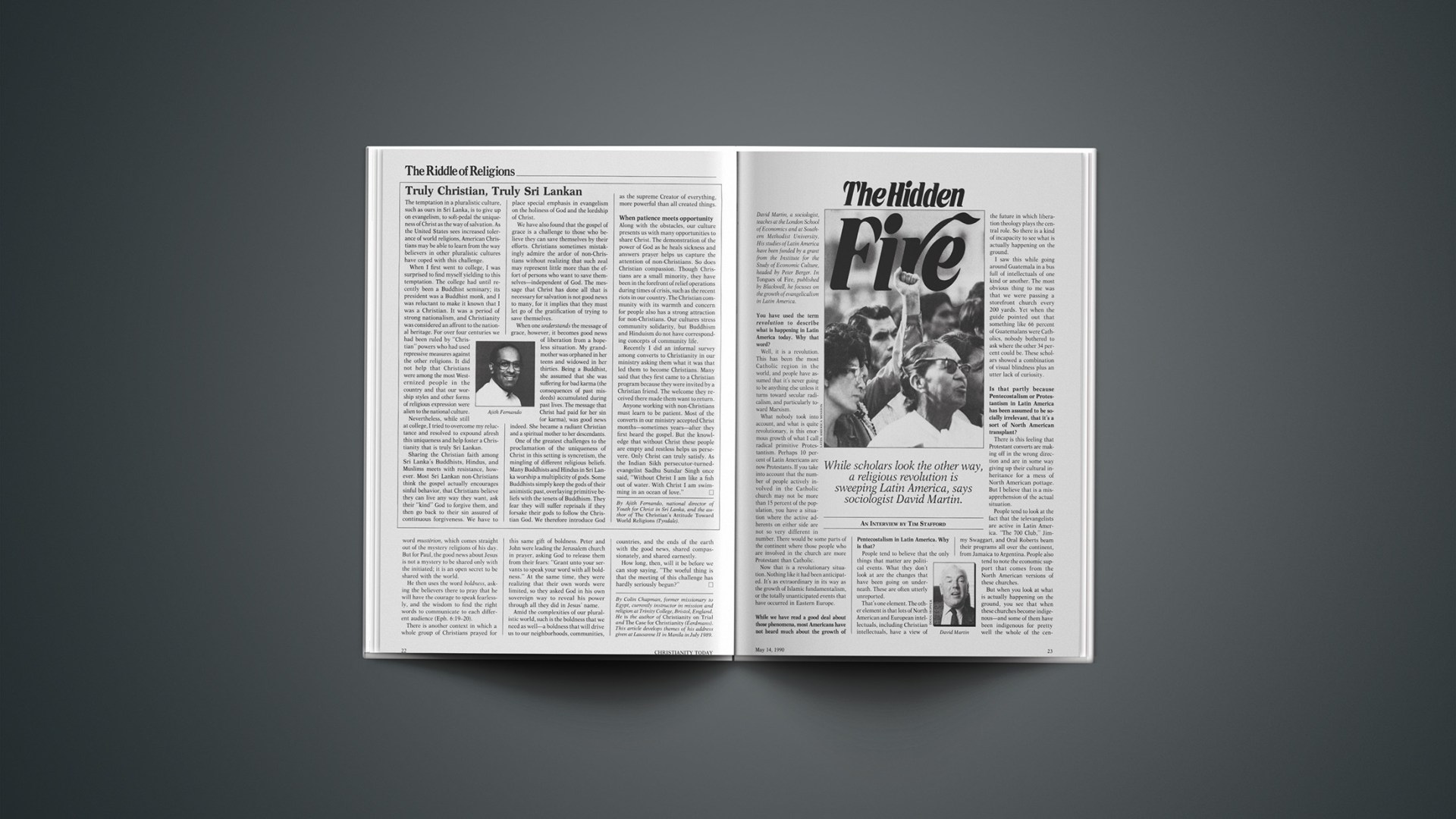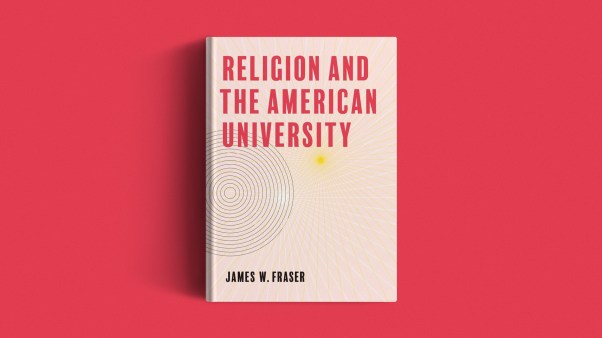While scholars look the other way, a religious revolution is sweeping Latin America, says sociologist David Martin.
David Martin, a sociologist, teaches at the London School of Economics and at Southern Methodist University. His studies of Latin America have been funded by a grant from the Institute for the Study of Economic Culture, headed by Peter Berger. In Tongues of Fire, published by Blackwell, he focuses on the growth of evangelicalism in Latin America.
You have used the term revolution to describe what is happening in Latin America today. Why that word?
Well, it is a revolution. This has been the most Catholic region in the world, and people have assumed that it’s never going to be anything else unless it turns toward secular radicalism, and particularly toward Marxism.
What nobody took into account, and what is quite revolutionary, is this enormous growth of what I call radical primitive Protestantism. Perhaps 10 percent of Latin Americans are now Protestants. If you take into account that the number of people actively involved in the Catholic church may not be more than 15 percent of the population, you have a situation where the active adherents on either side are not so very different in number. There would be some parts of the continent where those people who are involved in the church are more Protestant than Catholic.
Now that is a revolutionary situation. Nothing like it had been anticipated. It’s as extraordinary in its way as the growth of Islamic fundamentalism, or the totally unanticipated events that have occurred in Eastern Europe.
While we have read a good deal about those phenomena, most Americans have not heard much about the growth of Pentecostalism in Latin America. Why is that?
People tend to believe that the only things that matter are political events. What they don’t look at are the changes that have been going on underneath. These are often utterly unreported.
That’s one element. The other element is that lots of North American and European intellectuals, including Christian intellectuals, have a view of the future in which liberation theology plays the central role. So there is a kind of incapacity to see what is actually happening on the ground.
I saw this while going around Guatemala in a bus full of intellectuals of one kind or another. The most obvious thing to me was that we were passing a storefront church every 200 yards. Yet when the guide pointed out that something like 66 percent of Guatemalans were Catholics, nobody bothered to ask where the other 34 percent could be. These scholars showed a combination of visual blindness plus an utter lack of curiosity.
Is that partly because Pentecostalism or Protestantism in Latin America has been assumed to be socially irrelevant, that it’s a sort of North American transplant?
There is this feeling that Protestant converts are making off in the wrong direction and are in some way giving up their cultural inheritance for a mess of North American pottage. But I believe that is a misapprehension of the actual situation.
People tend to look at the fact that the televangelists are active in Latin America. “The 700 Club,” Jimmy Swaggart, and Oral Roberts beam their programs all over the continent, from Jamaica to Argentina. People also tend to note the economic support that comes from the North American versions of these churches.
But when you look at what is actually happening on the ground, you see that when these churches become indigenous—and some of them have been indigenous for pretty well the whole of the century—one of the things that helps them to take off is the degree of their independence.
A dramatic example, which goes back a long way, is Methodism in Chile at the beginning of this century. The American missionaries actually wanted to control the untoward enthusiasm of their converts. They found themselves with a revival of sorts on their hands, very like the original Methodist revival. Confronted with their own origins recurring in Latin America, they tried to clamp down on it. What the Chileans did was to make a declaration of ecclesiastical independence. That declaration was effective in that the church that declared itself independent now has over a million people in it, while the one that stayed within its North American restraints barely moved at all. The independent church is now the largest Protestant church in Chile.
Not only that, these groups are extremely fissile. They’re always breaking off one from the other. So there’s no question of some kind of central control from North America. In many countries, there are anything up to 350 separate groups working. So you have a completely open market in religious offerings. And many of them are very, very localized. Whatever the marginal influence that the power and attraction of the United States may be, whatever the help provided by intermittent finance, especially in the area of communications, the basic reasons have to be sought in Latin America itself.
What do you see as those basic reasons and aspirations in their culture?
They feel that the world in which they are living isn’t giving them what they hoped for. It doesn’t offer them betterment. And they come to feel that everything associated with that world is reprehensible. That includes the Catholic church. So they walk out.
It doesn’t really matter whether the Catholic church at this particular juncture is saying that it’s in favor of social change, or whether it’s allied with the landowners or the military. That’s not the political level at which these people are thinking. They are asking, What kind of commitment, here and now, in my locality, will allow me to rope myself together with other people so that we can start creating our own free social space? They’re trying to create a new world inside the New World.
For example, they are tied to the old system through the commitments of godparents. There are a whole set of complex obligations to those whom they take as godchildren. These are constantly tying them in to the old system. The same is true of the fiestas. You have to make certain expenditures as part of your contribution. Now all that belongs to the status quo ante, and what these people do is to walk out, and reconstitute themselves as brothers and sisters in Christ—that’s their phraseology.
Meaning that they do not continue to hold those old obligations.
That’s right. They move out of those obligations, not straightforwardly because they are obligations, but because they tie them in to everything that was before.
What about family life in Latin America? Is that also transformed?
Yes, that’s an excellent point. Pentecostals and the other Protestant groups are very keen on reconstituting the family and also altering the psychology of the male. Those two things go together. I talked to one Protestant who said, “We try to explain that a real man is not a man who can bed three women and shoot three men, but the one who can cope with one woman for one whole lifetime.” That is revolutionary in Latin American terms. It means giving a new kind of language to the male. This is the point made by a very interesting American anthropologist named Elizabeth Brusco. What she points to is the way in which the language of male preachers is full of the images of female nurture. There’s a softening of the Latin American male.
It’s important to recognize that the majority of Pentecostal and other evangelical groups are women, and quite a lot of them are abandoned women. They are creating a kind of female trade union, if I could put it that way, against the depredations of men. Within the church they find men who are better disposed toward them. There’s a kind of coming together of well-disposed males, and of females who want to find well-disposed males. There’s a kind of internal marriage market.
In the outside world they are very, very vulnerable. But within the disciplines of the church, they’re much less vulnerable.
As a British sociologist, how did you become aware of the growth of Protestantism in Latin America?
I got interested in it because of my study of the growth of secularization worldwide, particularly in Christian countries. Although it is perfectly possible in many countries to chart a change from a religious faith to a more secular faith, in the Latin American case it looked as though something quite unusual was happening.
The other element of my interest was that, coming from a Methodist background, I was interested in the growth of the Methodist movement and its relationship to the English industrial revolution. That led me to ask, Could something rather similar be happening in Latin America?
What similarities do you see?
One is that if you trace the ancestry of Pentecostalism, it leads back to Methodism. Most of the work on the origins of Pentecostalism lead back to holiness movements in the U.S., and those holiness movements are often breakaway movements within Methodism. So there is a line of ancestors there.
But the other more important connection is of a whole variety of effects associated with Methodism that apparently are being repeated in Latin America today.
Masses of world-shattering changes were going on in England in the mid-eighteenth century, and at the same time there was appearing a form of voluntary religiosity that was methodical—that’s what the word methodist means. It provides a kind of discipline of the self and a discipline of time that would go well with factory discipline. It also would provide a kind of emotional release at the same time. So there’s a double advantage—that you’re methodical on Mondays, and you express yourself on Sundays.
This kind of religion, while breaking the historic church-state connection, was of a moderate democratic kind, not inclined toward revolution, but inclined to teach people ways of running their own show. It provided them with all sorts of skills. But it didn’t lead them in a revolutionary direction. Whereas in France, for example, the breakup of the church-state relationship ended up in a very volatile, aggressive revolutionary situation.
What about the Catholic church in its relationship to these changes? Does it perceive the growth of Protestantism as a threat?
It certainly is the case that the Catholic church sees these groups as a threat. From time to time the Catholic church publishes a report on what is generally called the problem of the sects. That’s a rather pejorative way of putting it. The implication is that sects really have no right to be operating in what is fundamentally Catholic territory.
Many of the historic Protestant churches have actually respected that supposition. But the Pentecostals and the more strongly evangelical groups didn’t. Their success has really shaken the Catholic church. Instead of being a monopoly, they are in a market situation. That means they have to compete and look at what it is that is providing the dynamic for Protestant expansion.
There are two ways in which they tend to react. One is to speak of the natural relationship between Catholicism and Latin American culture. So that in Colombia, for example, it is frequently said that to be a Colombian is to be a Catholic. It’s part of the Spanish inheritance—a seamless web of culture of which Catholicism is a part. The Catholic church to some extent takes the line of “We’re having a kind of cultural invasion, and it’s our business along with all supporters of our culture to repel it.”
The other reaction of the Catholic church is quite different, and that is to say, “What is it about our situation that has encouraged them to take up these doctrines?” That’s a self-critical reaction. In it the Catholic church is asking, Have we offered something that would fully occupy the hearts and minds of people?
So when thinking about this revolution, one mustn’t merely ask, How many Pentecostals are there? You must also ask, What does this do to the Catholic church?
You’ve painted a picture of a movement that is largely invisible to international experts, which has had a radical impact on about 10 percent of the Latin American population. Do you have any thoughts on what we can expect as time goes on?
I think in order to assess that you have to take the view that change in daily culture has very important effects on a wider scale.
Perhaps I could draw a comparison. The myriad black churches in America were quietist in their attitude toward politics. Nonetheless, they created a very large social space in which they could be themselves, in which they could decide what happens, and in which they learned certain skills of administration and speaking. Those capacities could be deployed outside the sphere of the church and could also emerge in movements, like the civil-rights movement. At some point you’ve built up a whole series of latent capacities, and then at a given juncture, that can emerge into the political realm.
So you would anticipate that Pentecostalism or Protestantism will make a more public, political impact in Latin America.
Yes. Many people feel that Pentecostalism is either a form of nonpolitical quietism, or that it’s actually utilized by dictatorial regimes of the Right. The first thing I want to say is that these people have nothing much to anticipate from the powers of the Right or the Left. In particular, they have nothing to anticipate from either left-wing violence or right-wing violence. Those things have simply meant, so far as they are concerned, grief and suffering. So one finds that they regard violence as deeply repugnant. They’re not going to engage in any revolutionary movement that involves violence. That works itself out in various ways. For example, in Nicaragua they didn’t oppose the government [of the Sandinistas] on the whole. But they did not want to be drafted into collective work, particularly military operations. That kind of reorganizing of society along military lines simply doesn’t appeal to them, and they’ll not get mixed up in that.
It’s a shift outside of the system of violence, anything that involves the shedding of blood. Here they are related not simply to Methodism but to early Christianity. They have a deeply pacific view of the world. The development of a segment of the population that will have little to do with violence seems very significant to me.
Beyond that, most of the evidence suggests that they tend to behave rather similarly to other people of their status and situation. They are concerned with who can do something about the sewage, for example. Here the pastor acts like most of the other pressure groups. They go and talk to their political representative, saying, “Perhaps I can find you some useful votes from our church if you do something about the situation in our locality.” It’s traditional patronage politics that involves them rather the same way as it involves anybody else.
Your book, Tongues of Fire, is a sociological overview of the growth of evangelicalism in the whole of Latin America and the Caribbean.
Yes, and comparing it with similar changes occurring in other places in the world. This isn’t a movement just confined to Latin America. It’s occurring in parts of the Pacific rim, it’s occurring in parts of central, western, and southern Africa. There’s actually an enormous shift going on, of which the Latin American instance is the most dramatic case.
The charismatic movement has made quite a large impact in North America and in some British circles in the last few years. Do you see that as a parallel movement or something quite different?
I see it both as parallel and as something different. It’s not really on the same scale. I wouldn’t think that it’s more than one-tenth the size of the expansion of evangelicalism in Latin America. But then I think that a movement occurring within established churches has a different meaning from a movement where a key element is running your own show. So though the phenomenon is similar in terms of tongues, or of psychological warmth, community, and sharing, it has a different social meaning.
We’ve mixed the terms Pentecostalism and evangelicalism, but not all evangelicals are Pentecostals. Can you make any comparison between the groups in terms of their vitality, their size, how well they get along with each other?
They get along with each other insofar as they are not Catholics.
There’s a common “enemy”?
Yes, that’s right. So that if you went to a huge rally, you would find the Pentecostals mixing with the Baptists, Presbyterians, and so on. Amongst themselves they are very fissile. They’re constantly breaking up and setting up new movements. They can break up on every possible kind of principle. Another way of putting that is that they can readapt to any possible cultural situation.
There’s definitely a feeling of unease on the part of the historic churches, the Presbyterians and the Baptists, which were the principal Protestant churches in Latin America before the Pentecostals, because they have seen their dominance totally eroded. Forty years ago Pentecostals might have been a fairly small minority, and now they are anywhere up to 70 percent of the total Protestant population.
Do you anticipate that Protestantism will grow to be dominant in Latin American culture?
Here I go back to what I said about the effect it has on the Catholic church. The more the Catholic church feels itself under pressure, the more it may become like its competitors.
If you simply take the statistical trends, it would quite soon be the case that Guatemala is a Protestant country. The Brazilian trends also point to very extensive Protestantization. But it’s usually the case that there is some self-limitation in a movement like this. If people are walking out of something, it becomes a little bit difficult when there is nothing left to walk out of. The drama has got a kind of built-in deceleration.
But I also want to add that whereas in previous situations the group has simply risen socially and become part of the culture, in this situation they constantly recover themselves by splitting. There is a deep suspicion of the kind of cooling off that will destroy their cutting edge. They have an amazing capacity to renew their fervor.










